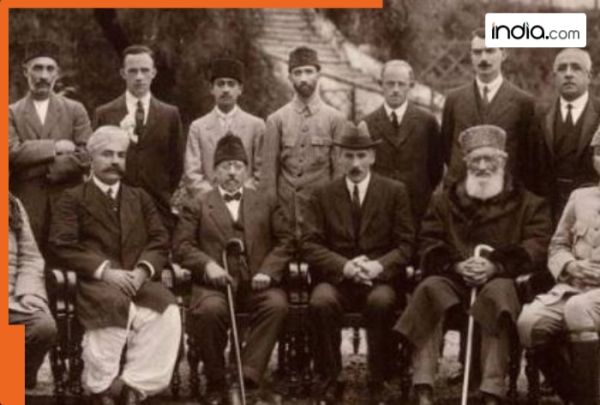This man was richest Hindu in Afghanistan, but left crores of Rs property behind and fled due to…
GH News October 16, 2025 03:06 PM

Richest Hindu of Afghanistan: Afghanistan is once again in the headlines as tensions rise with Pakistan along their border. We know Afghanistan for war chaos and Taliban rule but once it was among South Asia’s most prosperous trading centers. The Afghan Hindu community was also prominent in the country. There was also this richest Hindu of Afghanistan and who left so much property behind.
Who Was Richest Hindu Of Afghanistan?
Niranjan Das was known as the richest Hindu in Afghanistan. He was a senior official during the reign of Amanullah Khan (1919–1929). He was also the head of the Tax Department. He had influence in the royal court and was one of the most powerful Hindu representatives in the Afghan administration.
Apart from his official post he was a big merchant landowner and philanthropist with business interests from Afghanistan to India and Central Asia.
Wealth Of Niranjan Das
He owned several mansions estates and commercial establishments in Kabul and Kandahar. The exact value of his property is uncertain but according to media reports it was worth several crores of rupees at that time—equivalent today to hundreds of crores or even billions. During that era Afghan Hindu and Sikh businessmen were active in textiles spices precious stones and currency trade and Niranjan Das was considered the largest among them.
Why Niranjan Das Flee?
After political turmoil against Amanullah Khan’s instability gripped Afghanistan. With new governments started putting pressure on the Hindu community. They forced many to abandon their businesses and properties. Niranjan Das was among those who fled and left behind his immense wealth mansions and lands to migrate to India.
It is believed that some of his family members later settled in Delhi and Amritsar where they started new life.
Today Niranjan Das’s name has largely faded from history but his story reminds us that once Hindus in Afghanistan were not just a small minority—they formed an essential part of the country’s economic backbone.
 Richest Hindu of Afghanistan: Afghanistan is once again in the headlines as tensions rise with Pakistan along their border. We know Afghanistan for war chaos and Taliban rule but once it was among South Asia’s most prosperous trading centers. The Afghan Hindu community was also prominent in the country. There was also this richest Hindu of Afghanistan and who left so much property behind.
Who Was Richest Hindu Of Afghanistan?
Niranjan Das was known as the richest Hindu in Afghanistan. He was a senior official during the reign of Amanullah Khan (1919–1929). He was also the head of the Tax Department. He had influence in the royal court and was one of the most powerful Hindu representatives in the Afghan administration.
Apart from his official post he was a big merchant landowner and philanthropist with business interests from Afghanistan to India and Central Asia.
Wealth Of Niranjan Das
He owned several mansions estates and commercial establishments in Kabul and Kandahar. The exact value of his property is uncertain but according to media reports it was worth several crores of rupees at that time—equivalent today to hundreds of crores or even billions. During that era Afghan Hindu and Sikh businessmen were active in textiles spices precious stones and currency trade and Niranjan Das was considered the largest among them.
Why Niranjan Das Flee?
After political turmoil against Amanullah Khan’s instability gripped Afghanistan. With new governments started putting pressure on the Hindu community. They forced many to abandon their businesses and properties. Niranjan Das was among those who fled and left behind his immense wealth mansions and lands to migrate to India.
It is believed that some of his family members later settled in Delhi and Amritsar where they started new life.
Today Niranjan Das’s name has largely faded from history but his story reminds us that once Hindus in Afghanistan were not just a small minority—they formed an essential part of the country’s economic backbone.
Richest Hindu of Afghanistan: Afghanistan is once again in the headlines as tensions rise with Pakistan along their border. We know Afghanistan for war chaos and Taliban rule but once it was among South Asia’s most prosperous trading centers. The Afghan Hindu community was also prominent in the country. There was also this richest Hindu of Afghanistan and who left so much property behind.
Who Was Richest Hindu Of Afghanistan?
Niranjan Das was known as the richest Hindu in Afghanistan. He was a senior official during the reign of Amanullah Khan (1919–1929). He was also the head of the Tax Department. He had influence in the royal court and was one of the most powerful Hindu representatives in the Afghan administration.
Apart from his official post he was a big merchant landowner and philanthropist with business interests from Afghanistan to India and Central Asia.
Wealth Of Niranjan Das
He owned several mansions estates and commercial establishments in Kabul and Kandahar. The exact value of his property is uncertain but according to media reports it was worth several crores of rupees at that time—equivalent today to hundreds of crores or even billions. During that era Afghan Hindu and Sikh businessmen were active in textiles spices precious stones and currency trade and Niranjan Das was considered the largest among them.
Why Niranjan Das Flee?
After political turmoil against Amanullah Khan’s instability gripped Afghanistan. With new governments started putting pressure on the Hindu community. They forced many to abandon their businesses and properties. Niranjan Das was among those who fled and left behind his immense wealth mansions and lands to migrate to India.
It is believed that some of his family members later settled in Delhi and Amritsar where they started new life.
Today Niranjan Das’s name has largely faded from history but his story reminds us that once Hindus in Afghanistan were not just a small minority—they formed an essential part of the country’s economic backbone.